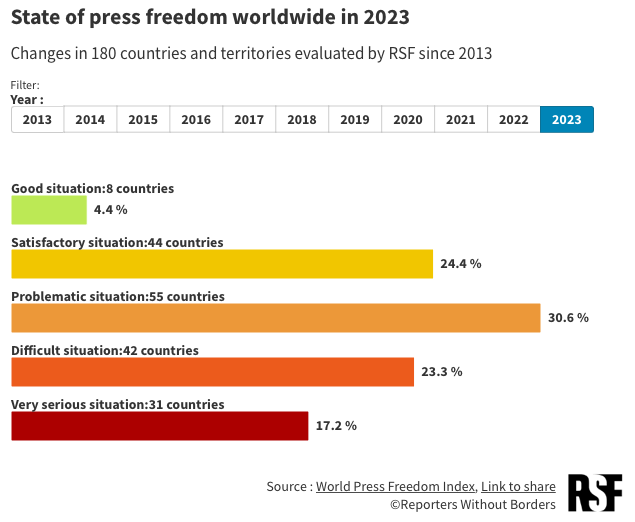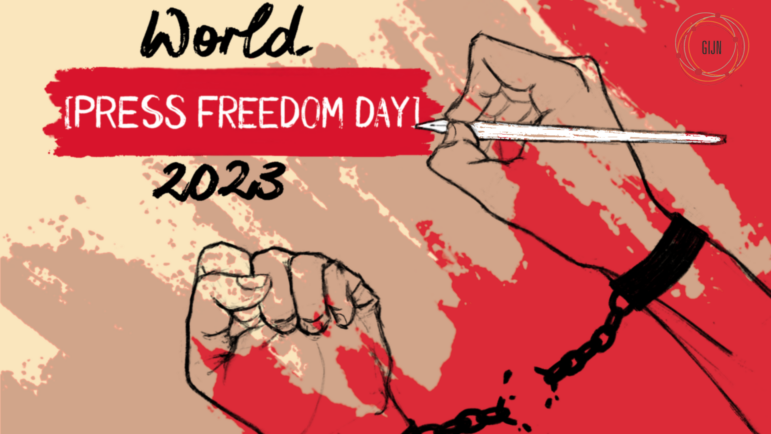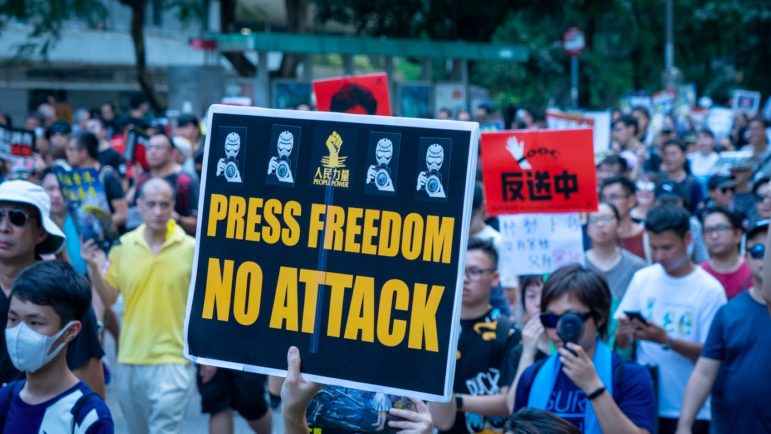

2024 World Press Freedom Index map. Image: Courtesy of Reporters Without Borders
2024 World Press Freedom Index: Political Pressure Threatens Journalism in a Key Election Year
Read this article in
In what amounts to a key election year, where roughly half the world will go to the polls, Reporters Without Borders (RSF) warns that political pressure is increasingly threatening journalism and the public’s right to know. In its 2024 World Press Freedom report RSF finds that the political indicator, one of five metrics used in compiling the index, has fallen the most, an average drop of 7.6 points across the globe. Overall, RSF’s World Press Freedom Index rated conditions for practicing journalism as satisfactory in only one quarter of 180 countries ranked around the world.
“States and other political forces are playing a decreasing role in protecting press freedom,” cautions RSF Editorial Director Anne Bocandé. “This disempowerment sometimes goes hand in hand with more hostile actions that undermine the role of journalists, or even instrumentalize the media through campaigns of harassment or disinformation. Journalism worthy of that name is, on the contrary, a necessary condition for any democratic system and the exercise of political freedoms.”
Nowhere is the threat to the press more evident and existential than in Gaza. Constant bombardment and military occupation of the territory by Israel in response to the October 7th attacks by Hamas has resulted in an unprecedented death toll, with nearly 100 members of the media — almost all of them Palestinian — killed in the past six months.
Elections in Focus
With 2024 shaping up to be perhaps the biggest election year in world history, RSF’s Index highlights the ominous trend of democratically elected politicians resorting to authoritarian crackdowns and rollbacks of press freedom. One particular example cited was the case of Argentina’s new president, Javier Milei, whose open antagonism toward journalists and shut-down of the country’s biggest news agency caused his country’s ranking to plummet 26 spots (from 40th to 66th) on the Index this past year.
The United States, heading into a momentous election later in the year, saw its ranking fall 10 places to 55th, as major structural barriers to press freedom continue — although the prospect of its legislature passing a federal media shield law offers a positive outlook. Mexico (121st) will also hold a major presidential election in 2024, and remains one of the deadliest countries for reporters.
Recent elections in African nations such as Nigeria (112th) and the Democratic Republic of Congo (123rd) have also been marked by violence against reporters. In Turkey, President Recep Teyyip Erdogan’s re-election looks to prolong a dark period for the press (158th). And in Italy (46th), Prime Minister Giorgia Meloni’s parliamentary coalition has embarked upon an attempted takeover of the country’s second-largest news agency, part of a larger trend of consolation and media capture in the nation.

2024 World Press Freedom Index country ranking list. Image: Courtesy of Reporters Without Borders
Media Censorship Grows and New Nations Claim the Title of World’s Worst
In Russia (162nd), which began blocking RSF’s website in the weeks leading up to this year’s release of the World Press Freedom Index, media censorship remains particularly onerous. Russia’s influence also acts as a kind of leading indicator for a broader erosion of press freedom across the region, as Belarus, Georgia, Kyrgyzstan, and Azerbaijan have all seen their rankings drop in the past year, as some of its same oppression tactics, including “foreign agents” laws, have spread. Ukraine (61st), still under attack from Russia, rose 18 places from 2023’s ranking but continues to suffer from the physical security risk of the invasion as well as from spying on the media and a lack of transparency from the Ukrainian government.
While perennial opponents of press freedom like China (172nd), Vietnam (174th), Iran (176th), and North Korea (177th) showed no appreciable improvement in the past year, they were displaced as the world’s worst by three countries undergoing or just having suffered from active armed conflicts. In 2024, the trio of Afghanistan (178th), Syria (179th), and Eritrea (180th) fell to the bottom of the list. Yemen (154th) and Palestine (157th), also in the midst of war, continued to experience very difficult conditions for the press.
As evidenced by the individual countries making up the Index’s lowest ratings of “difficult” or “very serious,” the Asia-Pacific and Mahgreb-Middle East regions continue to have the world’s poorest press freedom environments. In the former, nearly two-thirds of the countries are rated as having “difficult” or “very serious” situations, while in the latter, the percentage is an alarming 95%.
Few Bright Spots
“The countries where press freedom is ‘good’ are all in Europe, and more specifically within the European Union, which has adopted its first media freedom law (EMFA),” the report notes. Norway ranks first in the world once again, with seven of the same eight EU countries from 2023 in the top category. Portugal (7th) moved up to a “good” ranking this year, while Lithuania (13th) fell six places from last year to a “satisfactory” rating. This continues a streak where Europe is the lone region with nations featuring the top-rated press freedom environment. Canada (14th) is the highest-rated country from the Americas, with New Zealand (19th) tops in Asia-Pacific, and Mauritania (33rd) ranking highest in Africa.









